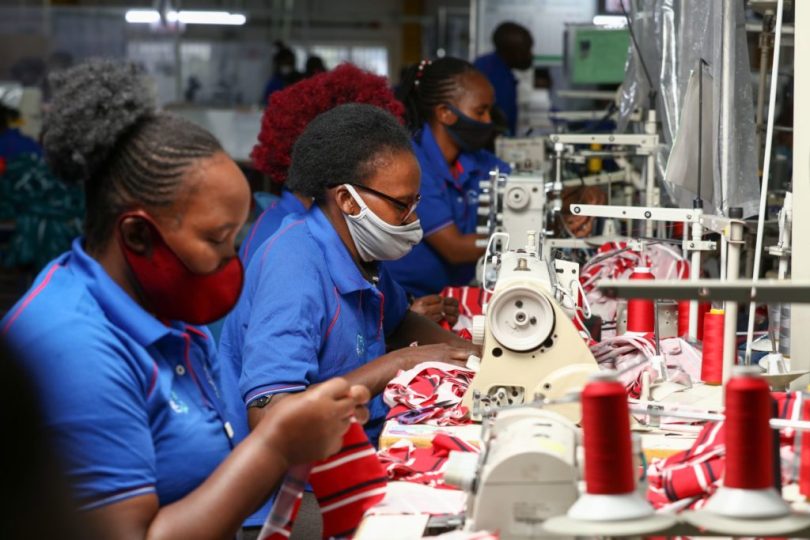Advertisements
Textile industry shines like a beacon full of potential. For experts who aspire to work in the textile sector, a textile factory job in Canada with free visa sponsorship is a gateway to success.
From the view of a sewing machine to the design process, work in textile industry encompasses many roles helping to create the fabrics that make the clothes for the world.
The appeal of the Canadian textile industry lies not only in technological advancements and innovations, but also in its commitment to producing first-class textiles. For those looking for a foothold in the industry, textile industry jobs aren’t just a job – they also provide an opportunity to weave talent in Canada’s thriving economy.
5 Textile Factory Jobs in Canada for Foreigners
- Sewing machine operator
Requirement
- Basic understanding of sewing techniques and machine operation.
- Attention to detail and accuracy in the following templates and instructions.
- Physical dexterity to operate the sewing machine for long periods of time.
- Ability to solve minor mechanical problems.
- Good communication skills to coordinate with supervisor and team members.
Duties
- Use a sewing machine to sew and stitch fabric details.
- Follow templates, templates and instructions exactly.
- Inspect finished products to detect defects and ensure quality standards.
- Perform routine maintenance and cleaning of sewing machines.
- Collaborate with colleagues to meet production goals and deadlines.
Advertisements
If you are eligible and meet the requirements, Apply Now
- Textile Designer
Requirement
- Degree or certificate in textile design, fashion design or related field.
- Proficient in using design software such as Adobe Illustrator or Photoshop.
- Have a creative mind and an eye for color, pattern and texture.
- Strong visual communication skills.
- Knowledge of fabrics and printing techniques.
Duties
- Develop innovative textile designs for fabrics and garments.
- Create digital or hand-drawn templates and sketches.
- Collaborate with the design team to come up with ideas for collections.
- Experiment with colors, patterns and materials to create unique designs.
- Adjust design based on customer feedback and market trends.
If you are eligible and meet the requirements, Apply Now
- Quality control inspector
Requirement
- Attention to detail with strong observation skills.
- Understanding of quality control principles and inspection procedures.
- Ability to use measuring tools and equipment.
- Effective communication skills to report results accurately.
- Knowledge of fabrics and manufacturing processes.
Duties
- Inspect textiles for defects and deviations from quality standards.
- Use measuring instruments to verify dimensions and specifications.
- Record and report test results and deviations.
- Coordinate with production teams to ensure that corrective actions are taken.
- Maintain accurate records of test reports and results.
If you are eligible and meet the requirements, Apply Now
- Dye and Finishing Technician
Requirement
Advertisements
- Technical diploma or relevant training in textile processing.
- Knowledge of dyeing and finishing techniques.
- Knowledge of chemical properties, colors.
- Device troubleshooting and troubleshooting capabilities.
- Be aware of safety when working with chemicals.
Duties
- Prepare dye solution and fabric treatment chemicals.
- Operate dyeing and finishing machines to color and finish fabrics.
- Monitor dyeing and finishing processes to ensure quality and consistency.
- Troubleshoot machinery and optimize process efficiency.
- Follow safety procedures and handle chemicals responsibly.
If you are eligible and meet the requirements, Apply Now
- Supervising producer
Requirement
- Bachelor’s degree or diploma in textile technology, industrial engineering or related field.
- Leadership skills and ability to manage production teams.
- Strong organization and time management skills.
- Technical knowledge of textile production process.
- Effective communication skills for team coordination.
Duties
- Monitor textile production processes to achieve quality and production targets.
- Assign tasks to production teams and ensure efficient workflow.
- Monitor the operation of the machine and promptly solve any problems.
- Train and coach production staff on best practices and safety procedures.
- Coordinate with other departments to ensure smooth production operations.
If you are eligible and meet the requirements, Apply Now
How to Apply for Textile Factory Jobs In Canada For Foreigners
- Identify job opportunities
If you have the necessary skills for a textile job in Canada, you can apply and be eligible for the job.
If you are eligible and meet the requirements, Apply Now
- Customize your resume
Write a professional resume that highlights your relevant skills, work experience, and education. Customize your resume for each application to highlight your suitability for the specific textile industry job.
- Network
Use professional networks, online forums, and social media platforms to connect with professionals in the Canadian textile industry. Networking can provide valuable information, referrals and leads to potential jobs.
- Job application
Apply for jobs at textile mills that offer free visa funding and match your qualifications. Submit well-organized applications with all required documents, including CV, cover letter and any additional certificates.
- Prepare for interviews
If you’re shortlisted, prepare for interviews by researching the company, the role, and the textile industry. Be prepared to discuss your skills, experience, and motivations for pursuing the job.
- Get a job offer
Passing the interview rounds can get a job offer from a Canadian textile manufacturing company. This offer is an important step in the process.
- Recruiter support
Employers will play an important role in the visa sponsorship process. They will need to apply for a Labor Market Impact Assessment (LMIA) to demonstrate a need for foreign workers and confirm that no Canadian citizen or permanent resident is suitable for the position.
- Apply for a work permit
Once the LMIA is approved, you can apply for a work permit. The work permit allows you to work legally in Canada. Make sure you have all the required documents, including your job offer, LMIA confirmation, and other supporting documents.
- Visa application
Depending on your nationality, you may need to apply for a Temporary Resident Visa (TRV) or an Electronic Travel Authorization (eTA) in addition to a work permit. Check the official Government of Canada website for visa requirements for your country.
Conclusion
Starting your journey to textile factory jobs in Canada as an expert is a goal that promises career growth, personal enrichment and the fulfillment of dreams. As you navigate the complexities of securing a position in the dynamic textile industry, remember that every step you take is an important step towards achieving your goals. From finding opportunities to creating the right applications, from networking with industry professionals to preparing for interviews, your efforts will pave the way to success.
The allure of free visa sponsorship adds an extra layer of appeal to your trip. This approach streamlines the immigration process, allowing you to focus on what really matters – bringing your skills to the Canadian textile industry. With each thread of dedication, you weave a tapestry of possibilities beyond borders.
Advertisements




